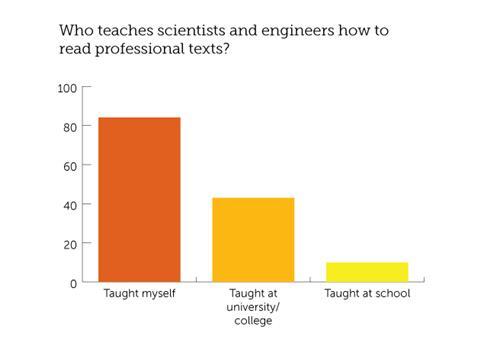Reading is a physics problem that doesn’t receive much attention in class. I think it should. Science professionals read a lot:

It turns out that the people who responded to the survey read a lot. Almost 85% of them read professional texts for more than 5 hours per week and 20% of them read for more than 15 hours per week. And they read to learn…

But most weren’t taught to do it at school.

This last chart troubles me. I know STEM texts (exams, textbooks, papers) are different to other texts. They use different vocabulary; follow different conventions and have a different purpose. Either learning to read these texts is so easy, it doesn’t require teaching, or it is hard and we are letting learners down.
How many capable young scientists and engineers are dropping out because they can’t access the information in texts? I worry about this a lot.
Cognitive Load Theory explains why reading is difficult and tells us how to make it easier. All three memories are in use:
- long-term memory – the knowledge you already have. Commit as much to memory as possible – use quizzes every lesson.
- working memory – where we compare what we’ve read to what we know and try to make meaning. There isn’t much we can do to boost this, though a good night’s sleep always helps me.
- external memory – the text, and any scribbles you’ve added to it. This is a skill and we should teach it.
Comprehension depends most on what you already know. The two most important things for reading are in your long term memory (or they need to be). They are vocabulary and knowledge. Readers who are equipped with these are equipped to understand texts.
Vocabulary
Science teachers are good at teaching science vocabulary. We explain clearly; we use example sentences; we revisit; we match words to diagrams. We use every trick we know.
But we ignore key non-specialist vocabulary. Words like: determine, suggest, establish and system (I took these from a couple of recent GCSE papers).
These words should be taken as seriously as technical vocabulary. It is hard to choose words to focus on. I tend to teach words as I come across them in textbooks and exam papers (especially if I think they could come up again).
Knowledge
Along with vocabulary, the most important part of understanding is what you already know: your schemata. As we read, the information in the text is held in your working memory to be presented to knowledge from your long-term memory like a debutante or a novice speed-dater. If sense can be made, great. If not, the reader has work to do.
Skills/Habits
Skills get tough press – but there are a few reading skills (or habits) which make a difference. These are the four that expert science readers (like us) use most often.
- I Wonder…. Expert readers ask questions of the text. Often these questions are related to meaning, but they can be “I wonder what that word means?” or, “I wonder why the writer said that…”
- In other words…. Paraphrasing (rewording, often making clearer) is a powerful comprehension checking skill/habit.
- I predict…. Asking readers to predict what comes next in a test is a useful way of drawing attention to the structure and conventions of scientific texts – it is extremely useful when scanning a text for the information you want to be able to predict whether the information might be in a nearby section.
- So far… Summarising is a habit which encourages prioritisation of information.
If these activities can be practiced enough (several times over a few weeks, with occasional top-ups) they quickly become part of a reader’s reading schema, increasing your students’ ability to learn from texts.
This blog is a development of the blog I wrote in 2015 for the Royal Society of Chemistry – here. I am reassured to find that I still agree with most of what I wrote then. Thank you if you’ve stuck with me all this time!
Ben

I completely agree that reading is a problem in stem subjects. My a-level students frequently tell me they can’t learn anything from textbooks. More worryingly I have a colleague who boasts that he doesn’t need to use text books.
LikeLike
Thanks – it’s often easier to ignore textbooks, but I’m convinced this leaves them hopelessly unprepared for university (and surely they need it to study well for A-level too?)
LikeLike